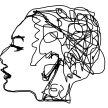Interesting Concepts in Psychology; Why we do bad Things
Why we act cruel, refuse help to those in need, and blame victims of crime or callous behaviour.

Unexplainable cruelty, ignoring people in need, and victim blaming;
Three selfish behaviours that all of us can unfortunately relate to. Whether you've been on the receiving end or have been the one partaking in it, there is a psychological explanation that might help you understand why.
Cognitive Dissonance
Cognitive dissonance is that icky feeling you get when your behaviour and belief systems don't align. Perhaps you are trying to give up smoking. You've told your family that you will and yet here you are at the drug-store purchasing another packet. That feeling sitting in the recesses of your mind? That's cognitive dissonance.
Cognitive: The process of thinking; the mind. Dissonance: Lack of harmony.
There are two ways in which people deal with cognitive dissonance. We can make it go away by changing our behaviour (i.e. deciding against purchasing that new packet of cigarettes) or we can change our belief systems (i.e. change our perspective of smoking). Research shows that nurses who smoke experience cognitive dissonance due to their knowledge of the negative consequences of smoking. For some nurses dissonance is a helpful tool that leads to a higher likelihood of quitting (Zhang & Jose Duaso, 2021). But what happens to the nurse who wishes to remove cognitive dissonance without quitting?
The only other option is for them to change how they feel about smoking. They might do this by looking for anecdotes that support the benign nature of cigarettes, or by asserting that they enjoy the social aspect of being a smoker. If one believes that their behaviour is a helpful tool for fitting in as opposed to a harmful addiction than they will be less likely to experience dissonance.
In the case of the smoker, cognitive dissonance that reinforces smoking is - for the most part - a self-inflicted woe. But cognitive dissonance can also cause tremendous harm when applied to ideology. Consider politics and bigotry.
What happens to the politician who is in charge of the wellness of thousands of people? Say they are tasked with creating a policy about human-rights. Their mind is not yet made-up about the policy, but they happen to live in a state in which the majority supports limiting the rights of the minority. As a result, the politician passes a bill that limits the rights of a group of people in an attempt to reflect 'community values'. If the politician feels guilty about this decision they can do one of two things to deal with their dissonance;
- Change their behaviour (fight for a different policy)
- Change their opinion (cherry pick evidence in favour of their policy)
In some instances, guilt stemming from cognitive dissonance is so strong that the change in behaviour or opinion reflects that degree of guilt, and can result in unspeakable cruelty. If the politician feels incredibly guilty about limiting human rights, they may do extensive research and cherry-picking to confirm that their decision was correct in order alleviate their guilt. This can result in a stronger bigoted belief systems, and may lead to a self-perpetuating cycle; stronger prejudices will lead to more extreme policies, and so on.
The Bystander Effect
You've likely heard of it; the bystander effect occurs when a person or a group of people who are in need of help are ignored simply because everyone else assumes;
"someone else will step in and help them"

Image from Sketchplanations
This assumption can come about for many reasons. Consider the following examples;
- Someone who witnesses a car accident might put off calling the ambulance with the assumption that someone else probably already has, and they don't want to look foolish or to flood the helpline.
- Someone who witnesses a person having a seizure might ignore the sufferer, assuming that someone who is more qualified will step in to help.
- Someone who stumbles across a lost child might fail to ask if they need help based on the assumption that the child is not 'their responsibility' and someone related to the child will step in to save the day.
The bystander effect is most salient in populated areas. So, the larger the crowd the less likely one is to help (Hortensius & De Gelder, 2014). It's counter-intuitive and that's what makes it dangerous. While details of specific crimes won't be explored in this article, it should be noted that there are numerous cases of violent crimes that could have been avoided if people were aware of the bystander effect.
To break-free from the bystander effect, people who are in need of help can call upon specific people or make clear demands (if possible). For example, instead of saying "can someone help me" the person in need can say "you, in the blue shirt - can you call an ambulance?" This request is specific and actionable, and removes the chance that a bystander will assume "they don't need my help."
The Belief in a Just World
The Belief in a Just World sounds like a lovely and whimsical concept.
Ah... justice.
Ah... peace.
Aaah... victim blaming...
Wait, what? Yes you read correctly. The Belief in a Just World refers to the tendency to assume that people reap what they sow. This belief system often arises as a way to make sense of unfathomable evil. The fact that becoming a victim of a crime is random can be a hard pill to swallow, so those with weak mental-fortitude are more likely endorse logical fallacies that help them deal with the anxiety of possible victimhood. This leads to victim-blaming (Van den Bos & Maas, 2009). Consider these examples;
- Someone has their house-robbed; The victim-blamer states it was due to the home-owner leaving their curtains open and 'displaying' their goods for everyone to see.
- Someone is sexually-assaulted; The victim-blamer claims that it was the targets choice in outfit that lead to the assault, regardless of what they were wearing.
- Someone has their credit-card details stolen; The victim-blamer declares that it is the responsibility of everyone to ensure that they are up to date with scams and have premium internet security.
In each of these examples the justifications created by the victim-blamer suggest simple solutions to serious crimes; if one only remembers to close the curtains, dress modestly, and invest in high-quality internet security than they can not possibly become victims of a crime.
Of course, the justifications are inherently flawed in that they ignore the complex reasoning behind why perpetrators choose certain people to target. The thought process of the victim-blamer is that criminals choose the most 'deserving' victim as prey, and therefor the world is just and we reap what we sow. The reality - however - is that criminal motivation and victim preference is incredibly varied and can not be boiled down to one easy predictor.
In a sense, The Belief in a Just World is a hopeful ideology; it implies that we cannot fathom why someone would commit cruelty. But it is also ironic, as it is the people who hold this ideology that become heralds of injustice.

Now the world might seem more glum after reading through this article, but despair not! The simple act of educating yourself about the pitfalls of human psychology already has you one-step closer to overcoming them.
So thank you for reading, and don't let dissonance get you down.
This article was featured in Volume One of the Vocal Creators Chronicle as a piece for the column 'What Your Brain Doesn't tell you' - You can read the remaining stories by clicking here
____________________________________________________
References
Hortensius, R., & De Gelder, B. (2014). The neural basis of the bystander effect — The influence of group size on neural activity when witnessing an emergency. NeuroImage, 93, 53-58. https://doi.org/10.1016/j.neuroimage.2014.02.025
Van den Bos, K., & Maas, M. (2009). On the psychology of the belief in a just world: Exploring experiential and rationalistic paths to victim blaming. Personality and Social Psychology Bulletin, 35(12), 1567-1578. https://doi.org/10.1177/0146167209344628
Zhang, S., & Jose Duaso, M. (2021). The delivery of smoking cessation interventions by nurses who smoke: A meta‐ethnographic synthesis. Journal of Advanced Nursing, 77(7), 2957-2970. https://doi.org/10.1111/jan.14783
About the Creator
The Psychology Tutor
Your go-to place for quick psychology notes, deep dives into interesting concepts, and practice quizzes to aid in your studies.






Comments
There are no comments for this story
Be the first to respond and start the conversation.